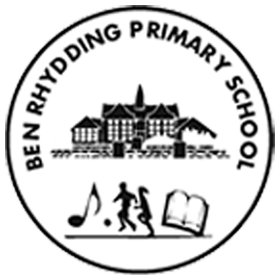English at Ben Rhydding
Intent
At Ben Rhydding Primary School, the foundations of accessing each part of the curriculum is channelled through the teaching and application of English. We seek to develop pupils who can who show high expectations of speech and oracy amongst their peers and teachers. We seek to develop pupils who love reading; we strive for all children to read fluently and confidently discuss their thinking and connections with books. We want pupils to see themselves as accurate and active writers, belonging to a community of writers and for them to be able to adapt their writing voice to different audiences with increasing effectiveness as they move through school.
Implementation
Our focus on reading and writing has foundations in the EYFS curriculum, where there is a focus on phonics, pre-cursive writing independent mark making, purposeful writing and developing an awareness of what it means to be a reader and what it is to enjoy and share books and the written word.
Our English curriculum is text-led. In KS1, our English learning sequence is taught through engaging picture books. Each sequence lasts 3-4 weeks and focuses on predicting, comprehension, vocabulary and grammar, drafting and publishing. These are taught with tasks using set scaffolds so the children can be explicitly taught how to make their thinking visible; these scaffolds are then used throughout the year to develop independence. Phonics is taught daily, with Y1 children preparing for their Phonics screening and Y2 children focusing on spelling rules. Reading books are sent home weekly matching the children’s phonics ability.
In KS2, children embark on a phased journey from picture books to chapter books and novels. Typically, this involves whole class reading every week or through ‘reading weeks’ with longer chapter books. Each year group selects books on an interwoven theme and where possible for greater depth readers, links are made between class texts. Our phonics scheme is still used throughout KS2 to support spellings rules and pupils seek to gain Pen Licences through a focus on handwriting and our school presentation promise.
Across school, Reading Roles are used to explicitly introduce and practice reading skills. Weekly prosody sessions are taught to develop pupil’s fluency and expression when reading and each class has access to our school library every week to promote a love of reading. Our younger pupils are paired up with older children for our Reading Buddy sessions and we actively encourage volunteers to come and read 1:1 with all year groups. In writing, pupils respond to a WAGOLL, developing key spelling, punctuation and grammar skills in the context of their class book and go through a phase of planning, drafting, revising, editing and publishing their writing to an audience.
Impact
We develop pupils who are able to immerse themselves in their reading, both at school and at home. Through this and with support, they develop individual confidence as a fluent reader, whilst communicating their ideas and thoughts to a community of readers. Equally, using this in-depth understanding of character, structure and vocabulary through engagement with nonfiction and fictional writing, pupils develop a strong voice as a writer, carefully honing both their transcription and communicative intentions in writing. Pupils use these skills across the curriculum and leave Ben Rhydding with excellent independent and communicative capabilities and ready to engage deeply with the wider world.
Supporting SEND
Strategies our staff have in place to support our SEN children include:
- Pre-teaching in small groups
- A variety of reading, writing and language interventions separate to whole class teaching
- Word and sound mats
- Overlays
- Widgit visuals
